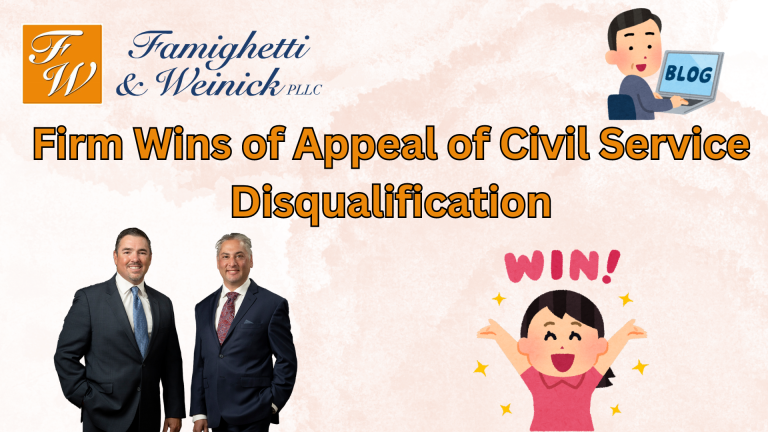- Free Consultation: (631) 352-0050 Tap Here to Call Us
Firm Wins of Appeal of Civil Service Disqualification

Last month, employment lawyers Famighetti & Weinick PLLC shared a client review in which the client rated the firm five stars and thanked us for helping him “win” his case. We promised to blog about the client’s interesting case and today is the day. Today’s Long Island employment law blog discusses the firm’s successful appeal of a civil service disqualification determination.
In New York, public sector jobs are generally regulated by the civil service commission. The state operates a state-wide civil commission, but counties and towns also maintain local civil service commissions to regulate employment within those municipalities. County civil service commissions may also have authority over public sector jobs such as school and library districts.
Part of the civil service commission’s job is to ensure that candidates for civil positions meet eligibility requirements. Sometimes those requirements mean a candidate must have particular relevant job experience and sometimes it means that the candidate must hold a special license or certification. Other times, the position has a residency requirement, meaning the candidate must have residency in the town, county, village, or school district, where the job will be. Typically, for a residency requirement, the candidate must have held the necessary residency for the 12 months prior to the appointment.
In a recent case handled by civil service lawyers Famighetti & Weinick PLLC, the firm’s client had been employed by a Long Island school district for many years. Out of the blue, the county civil service commission issued a letter to the client indicating it determined that the client did not meet the residency requirements for his position at the time of his appointment, many years earlier. Accordingly, the commission voted to disqualify the client from his job. Put another way, the commission’s decision meant that the client would lose his job and be out of work.
Desperate, the client came to Famighetti & Weinick for help. The civil service rules provide for an appeals process, but it provides a very short window of opportunity — just 30 days. With time already elapsed, Famighetti & Weinick went right to work devising a strategy for the appeal. The firm developed a two pronged attack on the commission’s decision.
First, the firm argued that the commission’s decision was arbitrary and capricious for two reasons: (1) the commission’s use of the term residency was too strict and (2) the facts proved that the client maintained residency as required by the job posting and consistent with the proper definition of residency. The unusual fact of this client’s case was that the client had recently been relocated at the time of the job application because of a home foreclosure. Thus, he had used some different addresses around the time of application and appointment.
But, residency is a legal term of art. As interpreted by New York’s appellate courts, residency requires a showing of a “bodily presence as an inhabitant in a given place.” It’s quite different than being a domiciliary, which is a stricter term requiring an intention to remain domiciled.
To illustrate the example of bodily presence required for a residency requirement, in an appellate court case concerning a firefighter in Buffalo, the firefighter owned a home outside the City of Buffalo where his wife and children lived. He also had an apartment within the City. The City of Buffalo tried to disqualify the firefighter for failing to satisfy the residency requirement, but the appellate court determined that because the firefighter maintained an apartment in the city, he satisfied the residency requirement. If the City had a domiciliary requirement, the case might have come out different.
In Famighetti & Weinick’s case, the firm relied on this interpretation of the word residency and showed, through credit card bills and delivery invoices, that the client maintained bodily presence within the jurisdiction during the applicable time period.
Next, the firm argued the civil service commission’s decision was unlawful. Pursuant to New York Civil Service Law Section 50, civil service commissions can investigate background and qualifications of candidates after appointment, but not more than three years after appointment, unless the commission alleges the candidate had engaged in fraud. In the firm’s case, the commission’s decision was issued more than three years after the appointment, so the decision was unlawful unless it was based on the candidate’s fraud.
Here, the commission did not allege fraud, but to be sure the exception to the three year rule did not apply, the firm detailed the very high standard the commission must meet to prove fraud. Indeed, the commission was required to have clear and convincing evidence of “substantial fraud.” The firm then detailed how the commission could not possibly meet its burden because the overwhelming evidence showed that the client actually resided in the jurisdiction and no evidence of fraud existed.
Notably, the commission’s decision was not enforced pending the appeal. After some tense weeks of waiting, the firm finally received a decision reversing the disqualification. The firm won!
If you have questions about civil service residency requirements, civil service appeals, or other civil service questions, contact civil service lawyers Famighetti & Weinick PLLC. Our phone number is (631) 352-0050. We have more information available on our website: https://www.linycemploymentlaw.com/civil-service.html.









